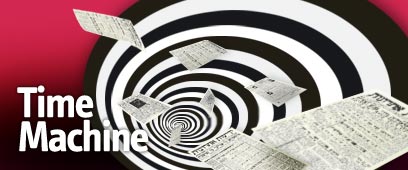
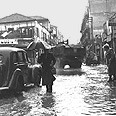
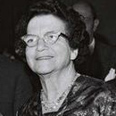
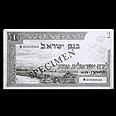
The man who would be Robin Hood
On January 12, 1951, a good fairy arrived at Jalil transit camp. As in a fairy tale, she began to go from tent to tent sprinkling magic dust in the form of five lira notes. In reality the fairy was tall man dressed in tattered clothing that was being chased at that moment by hundreds of Israeli policemen
Unfortunately, reality tends to be more complex. The question arises - is there a clear, sharp line separating the sane from the mentally ill? Or can a certain event, at a certain day or a certain hour, cause a totally sane man to skip over that imaginary line straight into crazy land? Maybe, or at least that is what seems to have happened in our adventurous story about the bank teller, Gershon Pe’er.
The flood and the bank teller
In order to fully understand this story, we have to start at the beginning. And thus the beginning of the story of bank teller Gershon Pe’er does not include meditations on the meaning of insanity and madness. Rather, you will be surprised to hear it begins with the weather.
In the middle of December 1951, three weeks before this story reached its climax, unusually intense rains fell on the land of Israel. Not surprisingly, the young state was not prepared to deal with the copious amounts of rain that flowed through the streets, and its residents suffered the results: Many streets were cut off and wide-scale areas were deluged by unstoppable floods.
The people who suffered the most from the flooding were the residents of the ma’abarot and poor cities, where proper drainage tracks were not dug. One of those areas was the Montefiore neighborhood in southeast Tel Aviv. Most of the houses and streets were completely flooded, and entire families were trapped in homes threatened by the flowing water, while firefighters on boats (brought in from the Yarkon river) tried to quickly rescue them.
In any case, nothing in Pe’er’s life hinted to the change that was about to take place in his mental status: He was a descendant of an old Bilu family, 33 years old, married and the father of three children. During World War II, he served in the British army and during the War of Independence he served as a sergeant in the military office.
He was fluent in many languages and according to his wife, was interested in politics. He had worked for the past 14 years as a teller in Bank Feuchtwanger, and the bank employees described him as a talented man with a good heart, who was reserved and did not talk much.
In the beginning, his change in behavior did not warrant too much concern. The day after the floods, he organized an emergency collection at his work, even donating a quarter of his salary. A few days later, his managers noticed that the quiet teller’s behavior was not as it used to be, and in order to calm his unstable nerves he was sent, as was customary at the time, to a convalescent home in Tiberius.
The vacation did not calm Pe’er’s troubled mind and at its end when his family came to retrieve him, he jumped out of the car near Kibbutz Yagur and vanished. His wife immediately notified the police and they found her recalcitrant husband the next day, and returned him tied up and sedated to his family.
Half an hour after his return home, Pe’er once again escaped and began his adventures on the streets of Tel Aviv. On the first stop on his journey, he arrived at an apartment on 102 Ahad Ha’am street. In a conversation that arose between the surprised tenant and the sudden guest, the latter declared: “I am going to finish with Ben-Gurion. I am against the reparations (the reparations agreement with Germany) and I have gone underground”.
During his journey, Pe’er continued to announce his participation in this imaginary underground organization, but at this stage he did not elaborate. When the apartment owner went to the bathroom to wash his face, the “underground man” used this opportunity to steal a dagger that was hanging on the wall and to run out of the apartment.
A few minutes later, he arrived at a building on Maza Street and began to knock on the doors. He threatened one of the tenants with the dagger and made off with his car keys, and he stole a toy gun from a child in another apartment.
Armed with a dagger and a toy gun, Pe’er went to the homes of the managers of Bank Feuchtwanger. He threatened them to give him the keys to the bank and the safe. At the same time, the police received notice of the journey of the hallucinatory bank teller, but as is so often the case, it was too late to react.
A few minutes after he received the keys, Pe’er arrived at the Tel Aviv branch of Bank Feuchtwanger. The guard recognized him and tried to stall him, but he backed down when he saw the gun. He watched Pe’er empty the bank till of bills and notes worth 150,000 lirot (a vast sum when an apartment in central Tel Aviv at the time cost 7,000 lirot).
Robin Hood of the ma’abarot
Hours later, the police set out on an imaginary trek after the brave thief, yet they always remained a few steps behind him. Not all is known of Pe’er’s activities during these hours, but part of the time, he passed through several ma’abarot (transit camps) in the Sharon region. He walked by the tents with his stolen bag of money dispensing bills of five lirot to the happy residents.
A few minutes later, the police arrived to collect the bills (10,000 lirot in total) from the residents, who at that moment were not so happy.
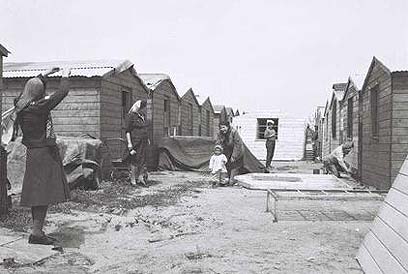
Ma'abara in Raanana (Photo: GPO)
Somewhere around Netanya, the police lost Pe’er’s tracks and began an unprecedented search. Despite these efforts, Pe’er was only found the next day. The fugitive spent the morning shopping and arrived at the “Hadassah” clothing store where he aroused the shop owner’s suspicion. She called the police about the “lunatic with a knife” and in a brave act of citizen’s courage, followed him on foot and found Pe’er at a coffee house and led to his arrest.
And the money? At his arrest, the bag of money was not found in his possession, and the police tried various ways to extract the hiding place from him. Pe’er refused to divulge any information, which led the police to scour many different and strange locations. Finally the police gave up, and the hero of the story was taken into custody at the police station in Petah Tikvah.
A short while after the arrest, a wave of rumors swirled through the country of a legendary amount of money hidden somewhere around Netanya. The rumors caused hundreds of residents to go out on extended night trips in search of the treasure.
The “gold frenzy” that arose among the area’s residents intensified the pressure on the police to restore order and the money to its owner before it was too late. The honor of the police and the restoration of law and order stood at the fore. Yet at the police station in Petah Tikvah, the investigators suffered disappointment after disappointment. After many hours of inquiry, they were not able to extract the truth from the thief.
Officer Meiri in the performance of his life
Investigative officer Meiri decided that he had no choice but to implement unusual creativity. If he was not able to extract Pe’er out of the imaginary world of a make believe underground, then the investigators would have to join him in that world. That night he entered Pe’er’s cell in civilian clothing, and introduced himself as Bar Kochba, the high commander in the imaginary underground that was created in Pe’er’s sick mind.
Officer Meiri’s game was sufficient to gain the trust of the underground man Pe’er, and in the next hour he revealed his plans to overturn the State of Israel. The two worked together on the operational details of the plan and decided to conquer Eilat that night and to take over the Voice of Israel radio station.
Right before they were set to leave, Meiri reminded him that they did not have the necessary funds to implement the plan. Luckily, Pe’er announced that he had the necessary money and the two snuck out of the cell, went into a jeep that was sent by the ”underground” and started their search for the missing money.
The two officers hurried to grab the treasure, but Pe’er announced that at this celebratory moment they had to stop and sing the national anthem. For reasons that only they know, the two acquiesced to his demands and sang “Hatikvah” at the top of their voice. Afterwards the three went back to the police station and returned the money to Bank Feuchtwanger. When they counted the money they found that 10,000 lirot were still missing.
The next morning, Meiri returned to his persona of underground commander Bar Kochva, enacted an attack on the police station, during which he tied up the officers, broke into Pe’er’s cell and rescued Pe’er from the station. In the next five hours, Pe’er led his redeemers on a hallucinatory journey, no less than the night before, and imposed different tasks on them to prove their loyalty.
Late at night, this group arrived at a beach near Kfar Vitkin, there Pe’er instructed his “men” to march for a few minutes in the sea, until they arrived at the hiding spot of the remaining money.
Under a pile of wood and a large rock, the police found the missing money, wrapped in a blood stained shirt. The police collected the money while Pe’er spread his shirt on the sand and in a heart breaking moment revealed deep, open wounds on his chest and said: “This is blood, the blood of my heart! With the blood of my heart I purified this impure money that is all holy to the underground."
The money was collected; the “underground” men returned to their police roles and asked Pe’er to return to the Jeep. When he refused, they forcefully carried him in. In one last act of kindness in his acting role, Meiri stood at attention in front of the prisoner and saluted him and said: “You have erred, commander, sir, in your duties. If you ask forgiveness, and come with us, we won’t shackle you, and we will bring you to judgment before the head underground commander”.
Pe’er acquiesced to their request, asked for forgiveness and the group returned to the police station. A few hours later, the money was returned to its owner, Gershon Pe’er was transferred to a hospital in Beer Yaakov and the story ended.
A happy ending and Paula Ben-Gurion
In 1960, the Yedioth Ahronoth newspaper published a series of articles entitled “Where are they now?” Under the auspices of this project, a reporter was sent to locate the bank teller/thief Pe’er, and found him managing a kiosk in Tel Aviv on the corner of Ben Yehuda and Keren Kayemet (today Ben Gurion Street).
After his release from the hospital a few years earlier, Pe’er was able to resume his normal life. In response to the reporter’s questions, Pe’er responded that his job is not bad and aside from a complaint about the amount of government taxes (as would any citizen), his situation is totally normal.
He ended the nostalgic meeting with an amusing anecdote - it appears that Paula Ben Gurion, the former Prime Minister’s wife, was a regular customer, and in one of their conversations, she suggested that he tear down the wall that was blocking his kiosk from the street.
“I can not”, replied the kiosk owner, “the city government does not allow changes in the structure”. Without knowing who was standing in front of her, Paula responded: “Don’t be a fool, first knock down the wall and then explain and apologize. What can they do? Hang you? When do they hang a thief, when they catch him? How do you know they will catch you?”
The next day, Pe’er relates, he hired workers to do the job. In summary: “It was the best advice I got in the past few years.”
If you have any more information, contact yinonro@y-i.co.il















